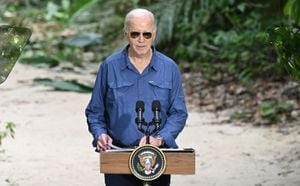The potential return of Donald Trump to the presidency has sparked significant concern among environmentalists and climate advocates, who fear for the future of the United States climate agenda. Trump, who previously questioned the reality of climate change, is poised to make significant shifts to U.S. environmental policy if he secures another term.
When Trump last held office, he implemented numerous rollbacks on environmental regulations, including the withdrawal from the Paris Agreement, which aims to curb global warming. Many observers are bracing for similar actions if he returns to power, particularly as recent polls indicate many Americans prioritize climate-related policies.
According to recent data from the University of Chicago, approximately 78% of Americans agree on the reality of climate change. Interestingly, this includes around 62% of Republicans. A significant percentage, about 68%, highlighted climate change as impacting their voting behavior during the recent elections. This backdrop emphasizes the inconsistencies between the public concern about climate issues and potential government actions reflecting Trump’s views.
During his previous administration, Trump’s stance on climate change positioned him as one of the most significant opposers of environmental regulations. He labeled climate change as a hoax and repeatedly criticized clean energy initiatives. This rhetoric has raised questions about his upcoming strategies—particularly following his appointment of Lee Zeldin as the Environmental Protection Agency (EPA) administrator.
Many critics have voiced their concerns, stating Trump is likely to emulate his past agenda, which dismantled over 100 environmental protections during his tenure. Environmental policy analysts warn of the dire consequences this could have, especially as the planet faces the intensifying impacts of climate change.
When it initially came to climate action, Trump dismissed the viability of wind and solar energy, promoting fossil fuels as the backbone of American energy production. This perspective is primarily fueled by substantial lobbying from oil interests, who reportedly donated over $75 million to Trump's political action committees during the 2024 campaign season. Such financial backing raises apprehensions about the potential for significant policy changes favoring the fossil fuel industry at the expense of renewable energy advancements.
With mounting evidence from scientific research supporting the urgent need for action against climate change, the disconnect between public sentiment and political leadership is growing increasingly concerning. Experts point out the substantial economic benefits of transitioning to clean energy sources which can generate millions of jobs and decrease reliance on foreign energy supplies.
The return of Trump could potentially reverse the progress made over the last two years toward adopting more stringent emissions regulations and incentivizing sustainable energy initiatives. Advocates for climate action are now urging legislators to push climate policy discussions forward before Trump potentially takes the helm again, advocating for resilience and proactive measures against climate-related legislation.
Even as public polls reveal growing interest surrounding climate issues, it remains uncertain how this concern will shift policies if Trump reclaims the presidency. The initiative for substantive climate action appears threatened by political ideologies opposed to scientifically supported directives, leaving activists worried about future legislative approaches to mitigate climate change impacts.
Experts on climate impact predict heightened natural disasters and environmental degradation if deregulation occurs, potentially manifesting as intensified hurricanes, floods, and droughts, severely impacting various sectors including agriculture, insurance, and public health. With climate action firmly entrenched as part of potential economic stimulus discussions, there is urgent need for political representatives to prioritize environmental policy regardless of the political climate.
Consequently, Trump’s anticipated second administration could plunge the U.S. back to previous policies deeply skeptical of climate science, placing the nation on course to forfeit significant progress made toward reversing climate change. Those favoring aggressive climate action are watching closely as election season approaches, mobilizing communities to advocate for sound policies through civic engagement.
The stakes could not be higher as states grapple with ever-pressing climate challenges. According to climate experts, the sustained impacts of climate change continue to threaten national security and economic stability, leaving many communities vulnerable to disasters prompted by global warming.
To navigate these uncertainties, environmental advocates stress the importance of fostering bipartisan support for climate initiatives. Strengthening relationships between lawmakers and their constituents can help restore faith in the system and drive forward legislation aimed at climate resilience and sustainability. If ever there was a time for unity and collective action on these pressing issues, it is now.



